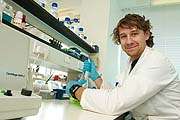Cancer stem cell discovery

(Medical Xpress) -- A Cardiff team has identified a weakness in breast cancer stem cells which could help prevent the disease from spreading. The team has found a laboratory method to switch off breast cancer stem cells’ resistance to a particular drug. The breakthrough offers the long-term possibility of blocking the cells from creating new tumours in patients.
The finding also highlights Cardiff’s strength in the increasingly important field of cancer stem cell research, having created the European Cancer Stem Cell Research Institute. This new discovery underlines just how critical cancer stem cells are in the spread and re-appearance of the disease.
Cancer stem cells make up only a small proportion of the cells in a tumour but many scientists now believe they are responsible for cancer growth, spread and relapse. They are also known to be highly drug-resistant. However, the Cardiff team, based at the School of Biosciences, has now managed to make breast cancer stem cells sensitive to the anti-cancer agent TRAIL.
TRAIL had not previously been seen as a breast cancer treatment, as it is blocked by a protein in the cells called c-FLIP. The Cardiff scientists have suppressed the effect of c-FLIP, making the cancer stem cells sensitive to TRAIL. With this method, the scientists achieved a 98 per cent reduction in secondary tumours. Importantly, they also showed that repeat treatment is equally effective in eliminating cancer stem cells if they re-appear. The Cardiff team’s long-term goal is now to trial the method on breast cancer in the body.
The paper on the findings has just been published in the journal Breast Cancer Research, with PhD student Luke Piggott the lead author. Luke is also familiar to ice hockey fans and has just signed a new contract with the Cardiff Devils Elite League team.
Luke’s supervisor, Dr Richard Clarkson of the School of Biosciences, said: "We believe we have found a crucial ‘Achilles heel’ in breast cancer stem cells. We can almost completely shut down their ability to spread the disease through the body through secondary tumours. Our success with repeat treatments is also important, offering hope that we can reduce relapse rates of the disease.
"These are very promising results but so far we have only seen this method work on cells in the laboratory. We need a lot more work to establish how best to suppress C-FLIP in patients and whether this can eliminate cancer stem cells in tumours in the breast."
Professor Alan Clarke, Director of the European Cancer Stem Cell Research Institute, added: "Luke’s results highlight the key role played by cancer stem cells in the spread and relapse of breast cancer. His study is further evidence for the Institute’s belief that it is vital to eliminate cancer stem cells if we are to be completely successful in treating all types of cancer."
Luke’s PhD studentship is funded by the cancer charity Tenovus through a support programme for early career cancer researchers. Research Grants Officer, Dr Anita Howman said: "Tenovus funded research is continuing to further our knowledge of how cancers form and create new drugs for some of the hardest to treat cancers. We are delighted to support Luke’s PhD studentship which has made an innovative discovery that will potentially benefit many people affected by breast cancer.
"One of Tenovus' proudest achievements is the early career research scientists we have helped to support and train through our PhD studentship funding programme which have benefitted close to 200 students. We now have nine active PhD studentships throughout Wales, with a further ten due to start in September. These projects not only aim to find new ways to detect and treat cancer, they also help to nurture the next generation of world class cancer researchers. "
The research was also funded by Breast Cancer Campaign. Dr Lisa Wilde, Director of Research at the charity said: "Over 12,000 people still die each year from breast cancer in the UK, mainly as a result of the disease spreading to other parts of the body. This research is an important early step in understanding the role cancer stem cells play in this process and could help us develop desperately needed new treatments to halt breast cancer spread in its tracks."















